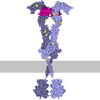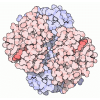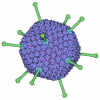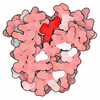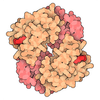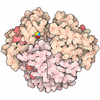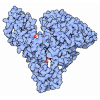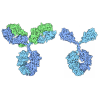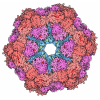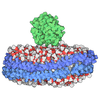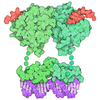[English] 日本語
 Yorodumi
Yorodumi- PDB-8skv: Structure of human SIgA1 in complex with Streptococcus pyogenes p... -
+ Open data
Open data
- Basic information
Basic information
| Entry | Database: PDB / ID: 8skv | ||||||
|---|---|---|---|---|---|---|---|
| Title | Structure of human SIgA1 in complex with Streptococcus pyogenes protein M4 (Arp4) | ||||||
 Components Components |
| ||||||
 Keywords Keywords | IMMUNE SYSTEM / Secretory immunoglobulin A / SIgA / IgA / group A streptococcus / Streptococcus pyogenes M protein / M4 / Arp4 / infectious disease / protein complex | ||||||
| Function / homology |  Function and homology information Function and homology informationpolymeric immunoglobulin receptor activity / immunoglobulin transcytosis in epithelial cells mediated by polymeric immunoglobulin receptor / polymeric immunoglobulin binding / dimeric IgA immunoglobulin complex / secretory dimeric IgA immunoglobulin complex / monomeric IgA immunoglobulin complex / pentameric IgM immunoglobulin complex / secretory IgA immunoglobulin complex / Fc receptor signaling pathway / IgA binding ...polymeric immunoglobulin receptor activity / immunoglobulin transcytosis in epithelial cells mediated by polymeric immunoglobulin receptor / polymeric immunoglobulin binding / dimeric IgA immunoglobulin complex / secretory dimeric IgA immunoglobulin complex / monomeric IgA immunoglobulin complex / pentameric IgM immunoglobulin complex / secretory IgA immunoglobulin complex / Fc receptor signaling pathway / IgA binding / IgA immunoglobulin complex / glomerular filtration / detection of chemical stimulus involved in sensory perception of bitter taste / IgG immunoglobulin complex / immunoglobulin receptor binding / immunoglobulin complex, circulating / azurophil granule membrane / receptor clustering / positive regulation of respiratory burst / humoral immune response / complement activation, classical pathway / Scavenging of heme from plasma / antigen binding / Cell surface interactions at the vascular wall / B cell receptor signaling pathway / epidermal growth factor receptor signaling pathway / transmembrane signaling receptor activity / antibacterial humoral response / protein-containing complex assembly / blood microparticle / protein-macromolecule adaptor activity / adaptive immune response / receptor complex / immune response / innate immune response / Neutrophil degranulation / signal transduction / protein homodimerization activity / extracellular space / extracellular exosome / extracellular region / plasma membrane Similarity search - Function | ||||||
| Biological species |  Homo sapiens (human) Homo sapiens (human) Streptococcus pyogenes serotype M4 (bacteria) Streptococcus pyogenes serotype M4 (bacteria) | ||||||
| Method | ELECTRON MICROSCOPY / single particle reconstruction / cryo EM / Resolution: 3.1 Å | ||||||
 Authors Authors | Liu, Q. / Stadtmueller, B.M. | ||||||
| Funding support |  United States, 1items United States, 1items
| ||||||
 Citation Citation |  Journal: Nat Commun / Year: 2023 Journal: Nat Commun / Year: 2023Title: SIgA structures bound to Streptococcus pyogenes M4 and human CD89 provide insights into host-pathogen interactions. Authors: Qianqiao Liu / Beth M Stadtmueller /  Abstract: Immunoglobulin (Ig) A functions as monomeric IgA in the serum and Secretory (S) IgA in mucosal secretions. Host IgA Fc receptors (FcαRs), including human FcαR1/CD89, mediate IgA effector functions; ...Immunoglobulin (Ig) A functions as monomeric IgA in the serum and Secretory (S) IgA in mucosal secretions. Host IgA Fc receptors (FcαRs), including human FcαR1/CD89, mediate IgA effector functions; however, human pathogen Streptococcus pyogenes has evolved surface-protein virulence factors, including M4, that also engage the CD89-binding site on IgA. Despite human mucosa serving as a reservoir for pathogens, SIgA interactions with CD89 and M4 remain poorly understood. Here we report cryo-EM structures of M4-SIgA and CD89-SIgA complexes, which unexpectedly reveal different SIgA-binding stoichiometry for M4 and CD89. Structural data, supporting experiments, and modeling indicate that copies of SIgA bound to S. pyogenes M4 will adopt similar orientations on the bacterium surface and leave one host FcαR binding site open. Results suggest unappreciated functional consequences associated with SIgA binding to host and bacterial FcαRs relevant to understanding host-microbe co-evolution, IgA effector functions and improving the outcomes of group A Streptococcus infection. | ||||||
| History |
|
- Structure visualization
Structure visualization
| Structure viewer | Molecule:  Molmil Molmil Jmol/JSmol Jmol/JSmol |
|---|
- Downloads & links
Downloads & links
- Download
Download
| PDBx/mmCIF format |  8skv.cif.gz 8skv.cif.gz | 583.7 KB | Display |  PDBx/mmCIF format PDBx/mmCIF format |
|---|---|---|---|---|
| PDB format |  pdb8skv.ent.gz pdb8skv.ent.gz | 476.3 KB | Display |  PDB format PDB format |
| PDBx/mmJSON format |  8skv.json.gz 8skv.json.gz | Tree view |  PDBx/mmJSON format PDBx/mmJSON format | |
| Others |  Other downloads Other downloads |
-Validation report
| Arichive directory |  https://data.pdbj.org/pub/pdb/validation_reports/sk/8skv https://data.pdbj.org/pub/pdb/validation_reports/sk/8skv ftp://data.pdbj.org/pub/pdb/validation_reports/sk/8skv ftp://data.pdbj.org/pub/pdb/validation_reports/sk/8skv | HTTPS FTP |
|---|
-Related structure data
| Related structure data |  40568MC  8skuC M: map data used to model this data C: citing same article ( |
|---|---|
| Similar structure data | Similarity search - Function & homology  F&H Search F&H Search |
- Links
Links
- Assembly
Assembly
| Deposited unit | 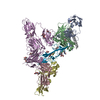
|
|---|---|
| 1 |
|
- Components
Components
-Immunoglobulin ... , 2 types, 5 molecules ABCDJ
| #1: Protein | Mass: 37687.488 Da / Num. of mol.: 4 Source method: isolated from a genetically manipulated source Details: The sequence of the Fab region is not included due to legal reasons. Source: (gene. exp.)  Homo sapiens (human) / Gene: IGHA1 / Cell line (production host): HEK Expi293F / Production host: Homo sapiens (human) / Gene: IGHA1 / Cell line (production host): HEK Expi293F / Production host:  Homo sapiens (human) / References: UniProt: P01876 Homo sapiens (human) / References: UniProt: P01876#3: Protein | | Mass: 15611.458 Da / Num. of mol.: 1 Source method: isolated from a genetically manipulated source Source: (gene. exp.)  Homo sapiens (human) / Gene: JCHAIN, IGCJ, IGJ / Cell line (production host): HEK Expi293F / Production host: Homo sapiens (human) / Gene: JCHAIN, IGCJ, IGJ / Cell line (production host): HEK Expi293F / Production host:  Homo sapiens (human) / References: UniProt: P01591 Homo sapiens (human) / References: UniProt: P01591 |
|---|
-Protein , 2 types, 3 molecules Eab
| #2: Protein | Mass: 61095.578 Da / Num. of mol.: 1 Source method: isolated from a genetically manipulated source Details: secretory component / Source: (gene. exp.)  Homo sapiens (human) / Gene: PIGR / Cell line (production host): HEK Expi293F / Production host: Homo sapiens (human) / Gene: PIGR / Cell line (production host): HEK Expi293F / Production host:  Homo sapiens (human) / References: UniProt: P01833 Homo sapiens (human) / References: UniProt: P01833 |
|---|---|
| #4: Protein | Mass: 37352.664 Da / Num. of mol.: 2 Source method: isolated from a genetically manipulated source Details: ectodomain of M4 Source: (gene. exp.)  Streptococcus pyogenes serotype M4 (bacteria) Streptococcus pyogenes serotype M4 (bacteria)Strain: M4 / Gene: arp4 / Production host:  |
-Sugars , 2 types, 11 molecules 
| #5: Polysaccharide | 2-acetamido-2-deoxy-beta-D-glucopyranose-(1-4)-2-acetamido-2-deoxy-beta-D-glucopyranose Source method: isolated from a genetically manipulated source #6: Sugar | ChemComp-NAG / |
|---|
-Details
| Has ligand of interest | N |
|---|---|
| Has protein modification | Y |
-Experimental details
-Experiment
| Experiment | Method: ELECTRON MICROSCOPY |
|---|---|
| EM experiment | Aggregation state: PARTICLE / 3D reconstruction method: single particle reconstruction |
- Sample preparation
Sample preparation
| Component |
| ||||||||||||||||||||||||||||
|---|---|---|---|---|---|---|---|---|---|---|---|---|---|---|---|---|---|---|---|---|---|---|---|---|---|---|---|---|---|
| Molecular weight |
| ||||||||||||||||||||||||||||
| Source (natural) |
| ||||||||||||||||||||||||||||
| Source (recombinant) |
| ||||||||||||||||||||||||||||
| Buffer solution | pH: 7 | ||||||||||||||||||||||||||||
| Specimen | Embedding applied: NO / Shadowing applied: NO / Staining applied: NO / Vitrification applied: YES | ||||||||||||||||||||||||||||
| Vitrification | Instrument: FEI VITROBOT MARK IV / Cryogen name: ETHANE / Humidity: 100 % |
- Electron microscopy imaging
Electron microscopy imaging
| Experimental equipment |  Model: Titan Krios / Image courtesy: FEI Company |
|---|---|
| Microscopy | Model: FEI TITAN KRIOS |
| Electron gun | Electron source:  FIELD EMISSION GUN / Accelerating voltage: 300 kV / Illumination mode: FLOOD BEAM FIELD EMISSION GUN / Accelerating voltage: 300 kV / Illumination mode: FLOOD BEAM |
| Electron lens | Mode: BRIGHT FIELD / Nominal defocus max: 2000 nm / Nominal defocus min: 800 nm |
| Image recording | Electron dose: 50 e/Å2 / Film or detector model: FEI FALCON IV (4k x 4k) |
- Processing
Processing
| CTF correction | Type: PHASE FLIPPING AND AMPLITUDE CORRECTION | ||||||||||||||||||||||||
|---|---|---|---|---|---|---|---|---|---|---|---|---|---|---|---|---|---|---|---|---|---|---|---|---|---|
| 3D reconstruction | Resolution: 3.1 Å / Resolution method: FSC 0.143 CUT-OFF / Num. of particles: 200000 / Symmetry type: POINT | ||||||||||||||||||||||||
| Refine LS restraints |
|
 Movie
Movie Controller
Controller



 PDBj
PDBj
